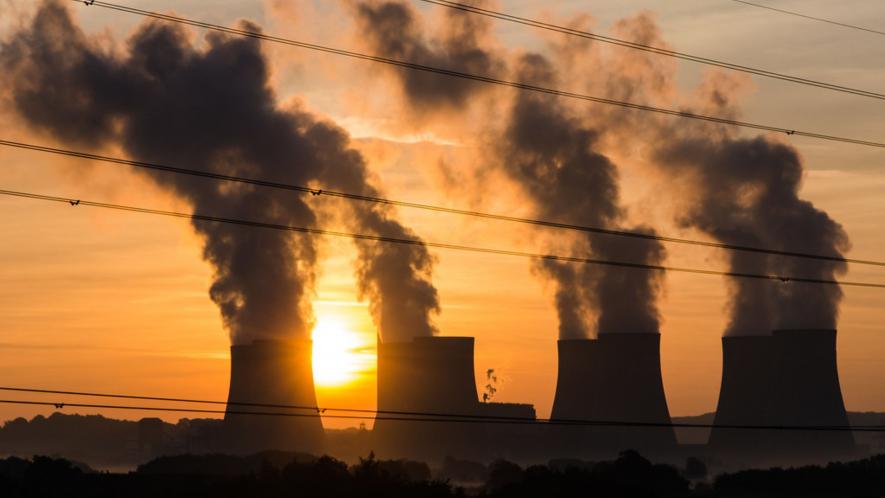Fossil Fuel-Producing Countries Eyeing More Extraction Even as 2023 is the Hottest Year Ever

Humanity has already started to get the hint about how dangerous the effects of climate change may be—the frequent massive storms, extreme heatwaves in otherwise colder parts of the world like Siberia, droughts, unprecedented floods, depletion of polar ice sheets and the resulting sea level rise.
Despite widespread campaigns and global treaties, there have been reports highlighting the failure of the world community to meet the aims of tackling global warming and climate change.
The latest such apathy can be traced to two findings— one is that 2023 is on track to be the hottest year in at least 125,000 years, showing the impending danger. The other one is the UN report showing that fossil fuel producers of the world are planning even more extraction that can increase the global carbon budget (the maximum amount of net global carbon emissions that would limit global warming to a given level) twice, increasing the risk manifolds.
The question is how serious the world is in achieving the goals set for limiting carbon emissions and global warming. At a time when the world is set to break all the previous records of warming, and a treaty like the Paris Agreement is in place, increasing fossil fuel production is just shocking. Remember, the Paris Agreement aims to limit global warming to 1.5 degrees Celsius compared to the pre-industrial level, for which limiting fossil fuel combustion is a primary criterion.
The 'Production Gap Report 2023' produced by the UN says that the fossil fuel production plans by the major petrostates would lead to about 460% more coal production, 83% more gas and 29% more oil in 2030, which was required to meet the aim of the Paris Agreement. More so, the report suggests that the fossil fuel extraction plans would lead to 69% more fossil fuel production than required to limit global warming to two degrees Celsius. Worth remembering here is that increasing the global temperature by two degrees more than the pre-industrial level would bring in more climate disasters than we have ever experienced.
The Production Gap Report was issued in 2019 for the first time; it tracked the gap between the planned expansion of fossil fuel production by governments and the global production level consistent with limiting the warming to 1.5 degrees Celsius or at max to two degrees.
The Gap Report 2023 suggests that the largest carbon emissions from planned fossil fuel productions will be from India in coal, Saudi Arabia in oil, and Russia in coal, oil and gas. The US and Canada will also be major oil producers like the UAE.
In a statement to The Guardian, Neil Grant, an author of the report, said, "Despite their climate promises, governments plan on ploughing yet more money into a dirty, dying industry, while opportunities abound in a flourishing clean energy sector. On top of economic insanity, it is a climate disaster of our own making."
"Major producer countries have pledged to achieve net-zero emissions and launched initiatives to reduce emissions from fossil fuel production, but none have committed to reducing coal, oil, and gas production in line with limiting warming to 1.5°C," says the UN report.
"Governments should be more transparent in their plans, projections and support for fossil fuel production and how they align with national and international climate goals."
"There is a need for governments to adopt both near- and long-term reduction targets for fossil fuel production and use to complement other climate mitigation benchmarks and reduce the risks of stranded assets. Countries with greater transition capacity should aim for faster reductions than the global average," the Gap Report suggests.
2023 is the Hottest Year
Scientists have estimated that 2023 will be the hottest year in the previous 125,000 years.
The C3S (Copernicus Climate Change Service) said the world was 0.4 degrees hotter than the previous record for the same month in 2019. Notably, October has been the fifth month in a row this year of record-breaking warmth. Scientists have warned that the extreme global temperature may continue into 2024.
The Deputy Director of the Copernicus Climate Change Service, Samantha Burgess, said that a combination of its data and that of the UN suggested that 2023 may be "warmer than anything that the planet has seen for 125,000 years."
October was 1.7 degrees Celsius hotter than the pre-industrial temperature. Moreover, the world breached the 1.5-degree threshold of the Paris Agreement for a record number of days. Previous reports showed that in one-third of the days of 2023, the average global temperature remained higher by 1.5 degrees than the pre-industrial level. Notably, the more individual days breach the 1.5-degree mark, the closer the world gets to breaching it in the long term.
As a result of a combination of carbon emissions and the ongoing El Nino event, the record-breaking warm months of the year were experienced, which can continue well into 2024. El Nino is a natural weather phenomenon when parts of the world remain warmer. But, this year's ongoing El Nino effect has coupled with global warming to make the planet unprecedentedly warmer.
The record in warmth will also bring in record human sufferings. The extreme temperatures have also made droughts more severe with extreme heatwaves in many parts of the world and eventually caused more people to suffer— deaths, loss of livelihoods, displacement, etc.
Get the latest reports & analysis with people's perspective on Protests, movements & deep analytical videos, discussions of the current affairs in your Telegram app. Subscribe to NewsClick's Telegram channel & get Real-Time updates on stories, as they get published on our website.
























